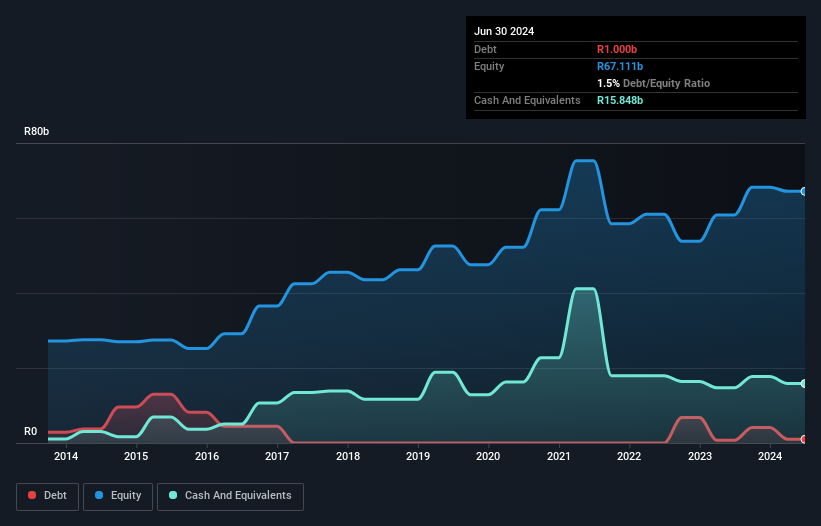- South Africa
- /
- Metals and Mining
- /
- JSE:KIO
These 4 Measures Indicate That Kumba Iron Ore (JSE:KIO) Is Using Debt Safely

The external fund manager backed by Berkshire Hathaway's Charlie Munger, Li Lu, makes no bones about it when he says 'The biggest investment risk is not the volatility of prices, but whether you will suffer a permanent loss of capital.' It's only natural to consider a company's balance sheet when you examine how risky it is, since debt is often involved when a business collapses. As with many other companies Kumba Iron Ore Limited (JSE:KIO) makes use of debt. But should shareholders be worried about its use of debt?
What Risk Does Debt Bring?
Debt assists a business until the business has trouble paying it off, either with new capital or with free cash flow. In the worst case scenario, a company can go bankrupt if it cannot pay its creditors. However, a more common (but still painful) scenario is that it has to raise new equity capital at a low price, thus permanently diluting shareholders. Of course, plenty of companies use debt to fund growth, without any negative consequences. The first step when considering a company's debt levels is to consider its cash and debt together.
Check out our latest analysis for Kumba Iron Ore
How Much Debt Does Kumba Iron Ore Carry?
The image below, which you can click on for greater detail, shows that at June 2024 Kumba Iron Ore had debt of R1.00b, up from R725.0m in one year. But it also has R15.8b in cash to offset that, meaning it has R14.8b net cash.

How Strong Is Kumba Iron Ore's Balance Sheet?
According to the last reported balance sheet, Kumba Iron Ore had liabilities of R9.80b due within 12 months, and liabilities of R16.3b due beyond 12 months. Offsetting these obligations, it had cash of R15.8b as well as receivables valued at R5.88b due within 12 months. So its liabilities outweigh the sum of its cash and (near-term) receivables by R4.36b.
Of course, Kumba Iron Ore has a market capitalization of R103.3b, so these liabilities are probably manageable. However, we do think it is worth keeping an eye on its balance sheet strength, as it may change over time. Despite its noteworthy liabilities, Kumba Iron Ore boasts net cash, so it's fair to say it does not have a heavy debt load!
Also positive, Kumba Iron Ore grew its EBIT by 27% in the last year, and that should make it easier to pay down debt, going forward. There's no doubt that we learn most about debt from the balance sheet. But it is future earnings, more than anything, that will determine Kumba Iron Ore's ability to maintain a healthy balance sheet going forward. So if you're focused on the future you can check out this free report showing analyst profit forecasts.
Finally, a business needs free cash flow to pay off debt; accounting profits just don't cut it. While Kumba Iron Ore has net cash on its balance sheet, it's still worth taking a look at its ability to convert earnings before interest and tax (EBIT) to free cash flow, to help us understand how quickly it is building (or eroding) that cash balance. During the last three years, Kumba Iron Ore produced sturdy free cash flow equating to 59% of its EBIT, about what we'd expect. This free cash flow puts the company in a good position to pay down debt, when appropriate.
Summing Up
While it is always sensible to look at a company's total liabilities, it is very reassuring that Kumba Iron Ore has R14.8b in net cash. And it impressed us with its EBIT growth of 27% over the last year. So is Kumba Iron Ore's debt a risk? It doesn't seem so to us. The balance sheet is clearly the area to focus on when you are analysing debt. However, not all investment risk resides within the balance sheet - far from it. Case in point: We've spotted 2 warning signs for Kumba Iron Ore you should be aware of, and 1 of them is a bit concerning.
When all is said and done, sometimes its easier to focus on companies that don't even need debt. Readers can access a list of growth stocks with zero net debt 100% free, right now.
Valuation is complex, but we're here to simplify it.
Discover if Kumba Iron Ore might be undervalued or overvalued with our detailed analysis, featuring fair value estimates, potential risks, dividends, insider trades, and its financial condition.
Access Free AnalysisHave feedback on this article? Concerned about the content? Get in touch with us directly. Alternatively, email editorial-team (at) simplywallst.com.
This article by Simply Wall St is general in nature. We provide commentary based on historical data and analyst forecasts only using an unbiased methodology and our articles are not intended to be financial advice. It does not constitute a recommendation to buy or sell any stock, and does not take account of your objectives, or your financial situation. We aim to bring you long-term focused analysis driven by fundamental data. Note that our analysis may not factor in the latest price-sensitive company announcements or qualitative material. Simply Wall St has no position in any stocks mentioned.
About JSE:KIO
Kumba Iron Ore
Engages in the exploration, extraction, beneficiation, marketing, sale, and shipping of iron ore for the steel industry in South Africa.
Undervalued with excellent balance sheet and pays a dividend.
Similar Companies
Market Insights
Community Narratives



